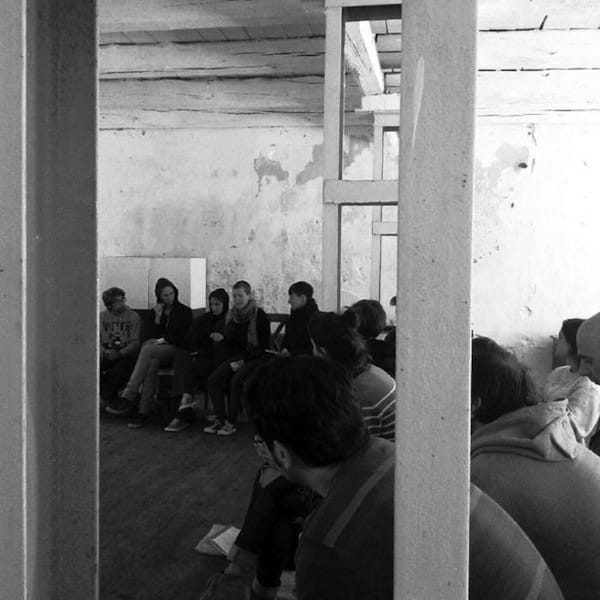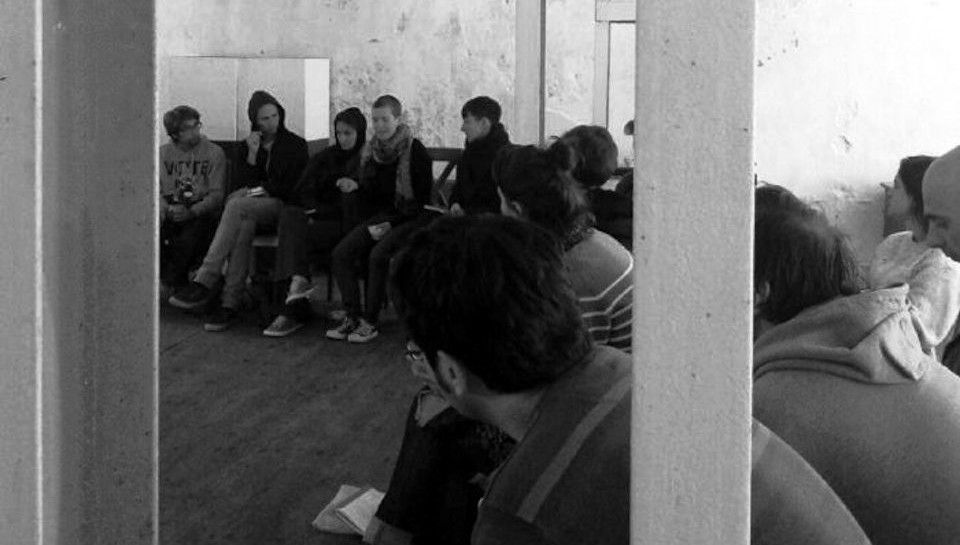How We Can Learn to Stop Worrying and Love the Peripheries.
Peripheralizing Europe (“an east/south encounter of translocal politics and practices”) is the title of a meeting that has taken place between July 30th and August 2nd 2015 near Kaunas/Lithuania. Activists,researchers, and cultural workers from Europe’s Eastern and Southern peripheries gathered to share knowledges, tell of experiences and map out the current situations at the margins of a continent in crisis. Peripheralizing Europe aimed at re-considering the value of the periphery, not just for the reproduction of the centre but also a key site for the articulation of struggles and counterhegemonic practices. The meeting has been organised by LeftEast (online platform across post-socialist countries), Murmurae (Barcelona-based platform for research and participatory methodologies), Egzilis (Kaunas Anarchist Collective) and the manor house of Žeimiai. In the wake of the meeting, the Peripheralizing Europe organizing group and some participants drafted a statement that Security Praxis is happy to re-post below.
Peripheralising Europe: Statement
Between July 30th and August 2nd, activists, researchers and cultural workers from across the Eastern and Southern European peripheries gathered in Žeimiai, Lithuania to discuss the current political situations and organizational practices within the European Peripheries. Around 40 people participated in this meeting based in 20 different countries, mostly on the EU periphery. Organised by Murmurae (transdisciplinary facilitation platform, ES), Egzilis (anarchist collective, LT), and LeftEast (online platform across post-socialist countries), this meeting brought together people from as many places as political backgrounds and ages.
We mapped our respective contexts, stakes, and strategies of our collectives and organisations through which resilient social movements are emerging. We worked through differences and commonalities of the Southern and Eastern peripheries, in order to build a shared analysis, conceptual framework and horizon for struggle. Our starting points were mutual recognition and support. The transversality of the meeting succeeded in producing a resonant space of listening, care, generosity and critical solidarity. This created the possibilities of further engagements, actions and micro-political analysis.

The peripheries continue to absorb the most brutal effects of the crisis of Europe. Europe’s margins are burning, not just with rapid declassing (PIIGS – Portugal, Italy, Ireland, Greece, Spain) and normalized poverty (the East) but also with people trying to cross minefields and seas and jump walls and fences, fleeing from, most often, the effects of western imperial and neo-colonial policies.
We call peripheralization the process of production of margins via subjection to a centre. It implies turning places and regions into reproductive spaces for the centre. In our countries, in the last 40 years, it has meant the destruction of welfare; the creation of highly exploitable, migratory work forces; the destruction of peripheral territories’ capacity to withdraw from integration into neoliberalism; and the attempt to make them competitive through the dumping of wages, taxes and social rights.
Our call to peripheralize Europe in turn points to the possibility of departing from that reproductive space and its knowledges in order to subvert existing power relations. To peripheralize Europe means to reject the developmentalist gaze according to which the centre is the future of the periphery. It means to recognize that the periphery is central, and to build struggles and resilience starting from the knowledges, practices and networks of the margins. It means to recognize that the center also has its own internal peripheries with regions and social groups that remain subjected to the same logic of marginalization, and in which we recognize ourselves.
To make this a reality, we identified a series of key tasks and processes. Starting from the Eastern and Southern peripheries, we must continue to:
The past of the Baltics and the Balkans is now becoming the present of the PIIGS. The pain of the age of austerity resonates with the experiences of “the transition” in the European East. History doesn’t quite repeat itself – but certain violent strategies of transformation are being reapplied. The politics of debt, belt-tightening and structural adjustment imposed in the post-socialist context since the 90s (and even before) hold many lessons that the PIIGS countries can learn from in the current moment.
Today we are seeing two particularly violent processes of transition in Greece and Ukraine. We must face these situations head on, without letting financial blackmail or militarisation create a climate of fear in Eastern Europe or the PIIGS. The violence needed to integrate a territory into neoliberal capitalism often functions as a means to destroy this territory’s capacity to withdraw from this integration, making it irreversible. What can we learn about this dynamic from Eastern and Southern European experiences?
A series of questions surfaced. Can we compare the Yugoslav wars of the 90s and the breakout of war in Ukraine, which both started precisely at the point where integration into the European market was imminent? What are the parallels between the way the socialist Syriza government in Greece has been submitted to subjugation and dependency, and the way possible futures in Eastern Europe were destroyed by dismantling forms of mutualism, public ownership and social organization that enjoyed high degrees of popular legitimacy?
In the light of recent developments, it has become apparent to everyone that the EU is not the guarantor of democracy, peace, and human rights that was sold to the post-authoritarian countries of the East and South as a model of progress. The crisis has also brutally uncovered the dangers of having the EU as the privileged horizon of our political desires. This poses the challenge to orientate ourselves towards new alliances and solidarities within, against and beyond the EU, as well as new institutions and notions of rights.
The politics of fear and patronizing financial technocracy mixed with structural adjustment and militarization play out differently across the two peripheries of Europe as Eurozone. Yet, instead of recognizing common conditions, we – aided by the mainstream media – often find ourselves assigning one another slots in hierarchies of civility, via accusations of laziness, administrative incapacity and corruption. This plays a role in our responses to the politics of austerity: the production of pride in the Eastern countries that have gone through “belt-tightening” without complaint, or the unwillingness to show solidarity with the PIIGS when none was extended towards the East during earlier cycles of crisis.
Facing this need to formulate a common conceptual framework and language to think common conditions and effects, we analysed stereotypes and gaps in knowledge across the East and South, discussing different histories and vocabularies in order to better understand the challenges we face. We mapped local and translocal struggles and addressed geo-, macro- and micropolitical challenges. We spoke of the movements and organisations that have emerged in our countries since the crisis, analysing their tactics and strategies and identifying upcoming challenges. Finally we made a calendar of mobilizations to come and discussed ways of supporting another in the heat of the autumn ahead of us.
There is now a window of time in which we can talk to each other in ways that overcome past separations. In the face of continued economic crisis and militarisation, this dialogue towards common action is urgent.
[This statement was drafted by the Peripheralizing Europe organizing group and some participants after the meeting. It will soon be published in different languages.]
[The abstract has been edited on 17 August 2015 to better reflect the actual organisers and contributors]
Acknowledgements
Cover photo: The Kaunas meeting, courtesy https://peripheralizingeurope.wordpress.com
